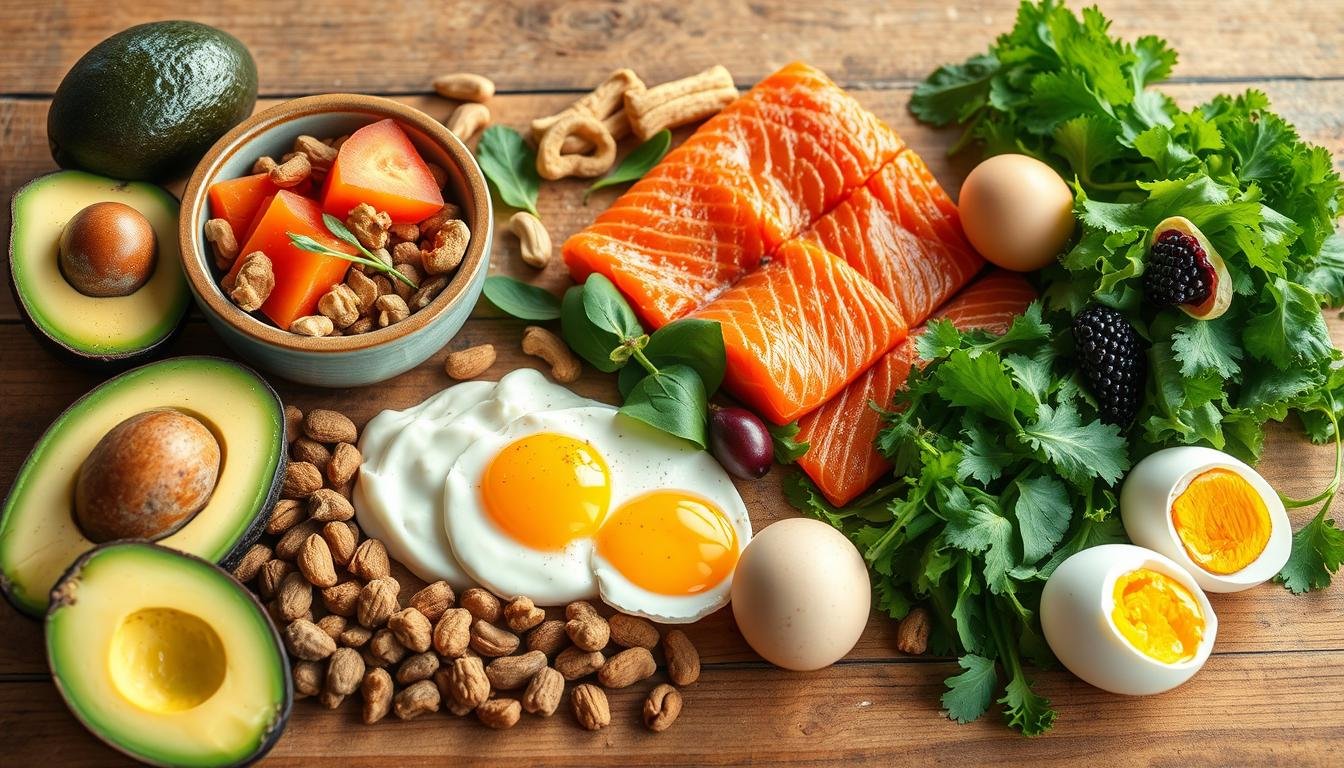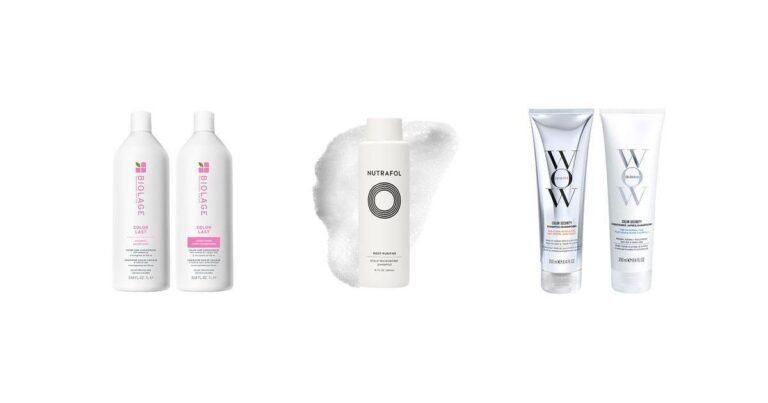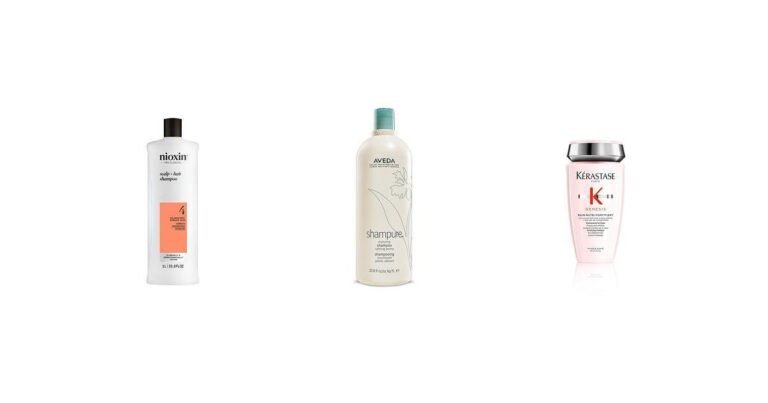What Is the Best Diet for Healthy Hair? – Expert Guide
Did you know that the average person has between 80,000 and 120,000 hair follicles on their scalp? Yet, many struggle with thinning, brittle, or dull-looking hair. The secret to lustrous locks may lie in your diet. What you eat can significantly impact the health and growth of your hair. From Essential vitamins and minerals to the role of protein and omega-3 fatty acids, this expert guide will reveal the best dietary practices for achieving vibrant, healthy hair.
Key Takeaways
- Nutritional deficiencies in vitamins, minerals, and Essential fatty acids can contribute to hair loss and poor hair health.
- Incorporating nutrient-dense foods like leafy greens, nuts, seeds, fish, and avocados can promote healthy hair growth.
- Avoiding processed foods, excess sugar, and high-mercury fish can help improve hair quality.
- Staying hydrated and managing stress are also important factors for maintaining healthy hair.
- Supplements like biotin, collagen, and specific vitamins may provide additional support for hair growth and strength.
Understanding the Importance of Diet for Hair Health
Maintaining healthy hair is not just about the products you use, but also the nutrients you consume. The hair growth cycle and cellular turnover are heavily influenced by various vitamins, minerals, and other essential nutrients. Nutritional deficiencies, such as those in vitamins B12, D, biotin, riboflavin, and iron, can contribute to excessive hair shedding and even hair loss. To support your hair’s health, a balanced diet rich in these key nutrients is crucial.
How Nutrition Affects Hair Growth
The quality and vitality of your hair are directly linked to the nutrients you provide your body. Protein, for instance, is essential for hair structure, as hair is primarily composed of a protein called Keratin. Healthy fats, such as those found in salmon, avocado, and coconut oil, promote microcirculation and reduce inflammation, further supporting hair growth. Vitamins and minerals like biotin, vitamin B12, C, E, and D, as well as calcium and iron, all play crucial roles in maintaining a healthy hair cycle.
Common Nutritional Deficiencies Impacting Hair
Nutritional deficiencies can be a significant contributor to hair loss and other hair-related issues. Close to 50% of men and women are affected by pattern hair loss by age 50. Iron deficiency, the world’s most common nutritional deficiency, is a well-known cause of hair loss, particularly in premenopausal women and vegetarians. Zinc deficiency, which may occur in malabsorption syndromes or following certain surgeries, can also lead to changes in hair texture and telogen effluvium (excessive shedding).
“Healthy hair starts from within. A balanced diet rich in essential nutrients is crucial for maintaining strong, vibrant locks.”
By understanding the profound impact of nutrition on hair health and addressing any potential deficiencies, you can take proactive steps to promote the growth and vitality of your hair.
Key Nutrients for Healthy Hair
Achieving luscious, healthy hair starts with a balanced diet rich in essential vitamins, minerals, and nutrients. From protein to omega-3 fatty acids, each component plays a crucial role in maintaining the strength, shine, and growth of your locks. Let’s dive into the key nutrients that should be on your radar for hair wellness.
Essential Vitamins and Minerals
Vitamins A, C, D, and E are all vital for optimal hair health. Vitamin C aids in collagen production and iron absorption, both of which are essential for hair growth and strength. Vitamin E acts as an antioxidant, protecting hair follicles from Damage. B Vitamins, including B6, B12, and folate, help create red blood cells that carry nutrients to the scalp and hair follicles. Additionally, zinc and selenium provide scalp protection and support hair follicle function.
The Role of Protein in Hair Structure
Hair is primarily composed of protein, so ensuring adequate protein intake is crucial for maintaining hair health and growth. Protein is the building block of hair, and a deficiency can lead to thinning, dull, and brittle locks. Incorporating a variety of protein-rich foods, such as lean meats, eggs, fish, legumes, and nuts, can help strengthen and nourish your hair from the inside out.
Importance of Omega-3 Fatty Acids
Omega-3 fatty acids play a vital role in hair health by promoting hydration and supporting healthy hair growth. These beneficial fats help prevent a dry, flaky scalp and keep hair follicles functioning optimally. Foods like wild salmon, mackerel, flax seeds, and walnuts are excellent sources of omega-3s, making them a must-have for luscious locks.
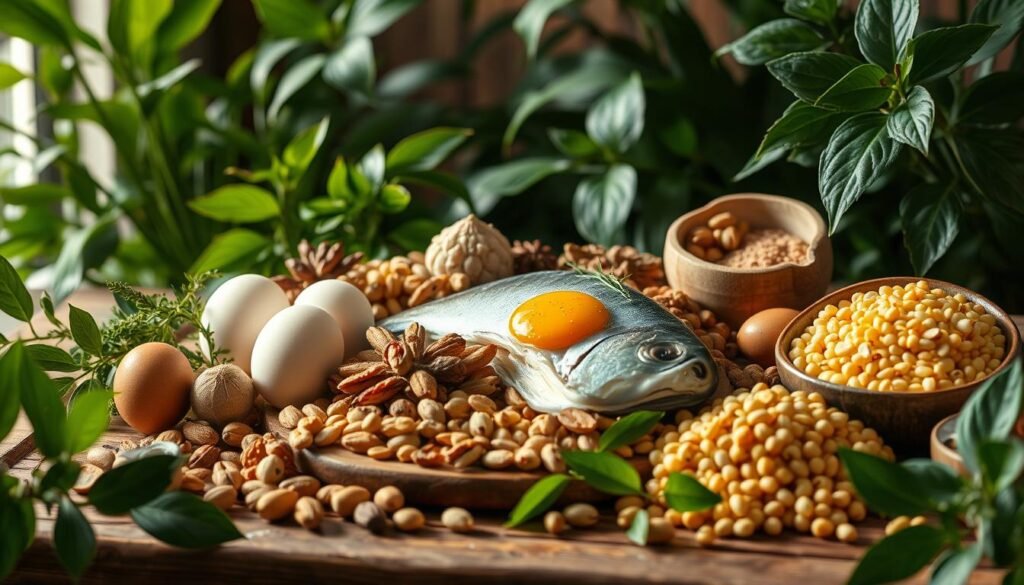
By incorporating these key nutrients into your diet, you can provide your hair with the essential building blocks it needs to thrive. Remember, a well-balanced, nutrient-rich diet is the foundation for healthy, vibrant hair.
Foods to Include for Lustrous Locks
Achieving healthy, vibrant hair starts with a nutritious diet. Certain foods are packed with essential vitamins, minerals, and fatty acids that nourish hair from root to tip, promoting growth, strength, and shine. Let’s explore some of the best foods for hair health.
Leafy Greens and Their Benefits
Leafy greens like spinach, kale, and Swiss chard are powerhouses of nutrients for hair. They are rich in vitamins A and C, iron, and folate – all of which play crucial roles in hair growth and maintenance. Incorporating these nutrient-dense greens into your diet can help prevent hair loss and keep your locks looking lush.
Nuts and Seeds: Tiny Powerhouses for Hair
Nuts and seeds are tiny yet mighty when it comes to supporting hair health. They are excellent sources of vitamin E, B vitamins, and minerals like zinc and selenium – all of which are essential for healthy hair. Almonds, walnuts, sunflower seeds, and chia seeds are particularly beneficial for hair growth and strength.
Fish: The Best Source of Omega-3s
Fatty fish like salmon, mackerel, and sardines are rich in omega-3 fatty acids, which are vital for hair health. Omega-3s help to reduce inflammation, promote blood circulation, and keep hair moisturized, resulting in thick, shiny locks.
Avocados and Their Nutritional Richness
Avocados are a nutritional powerhouse, packed with healthy fats, vitamins C and E, and biotin – all of which contribute to hair growth and strength. Incorporating avocados into your diet can nourish your scalp, keep hair hydrated, and even stimulate new hair growth.
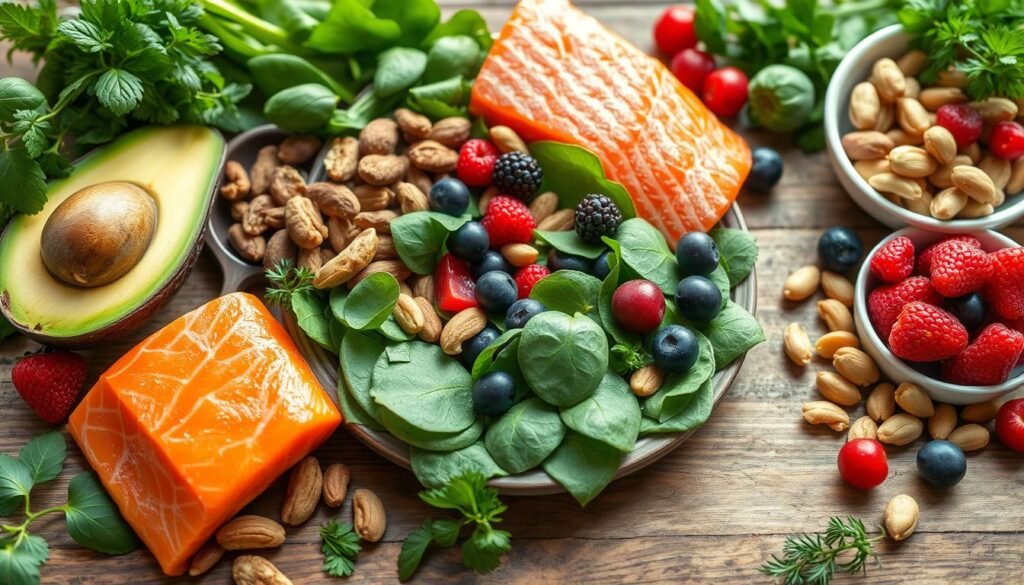
By incorporating these nutrient-dense foods into your diet, you can achieve the lustrous locks you’ve been dreaming of. Remember, a healthy hair diet is the foundation for beautiful, vibrant hair.
Foods to Avoid for Better Hair Health
While a nutrient-rich diet is essential for maintaining healthy hair, there are certain foods and dietary habits that can have a detrimental effect on your locks. By being mindful of these potentially harmful elements, you can make informed choices to support your hair health.
Processed Foods and Their Pitfalls
Processed foods often lack the essential nutrients required for optimal hair growth and health. These highly processed items, which are typically high in unhealthy fats, refined carbohydrates, and additives, can contribute to inflammation and hormone imbalances, both of which can negatively impact hair follicles and lead to thinning or loss.
Excess Sugar and Its Negative Impact
Consuming too much added sugar can also have detrimental effects on hair health. A diet high in simple carbohydrates may increase sebum production and negatively affect blood vessels in the scalp, potentially leading to hair loss. Additionally, excess sugar can cause nutritional deficiencies that can further compromise hair health.
The Dangers of High Mercury Fish
While fish can be an excellent source of omega-3 fatty acids, which are beneficial for hair, certain types of fish can pose a risk. According to a 2019 case study, consuming mercury-rich fish such as tuna may be linked to hair loss, particularly in women during the menopausal transition.
It’s important to be mindful of your dietary choices and strive to limit these potentially problematic foods and habits. By making informed decisions, you can support your hair health and promote the growth of strong, lustrous locks.
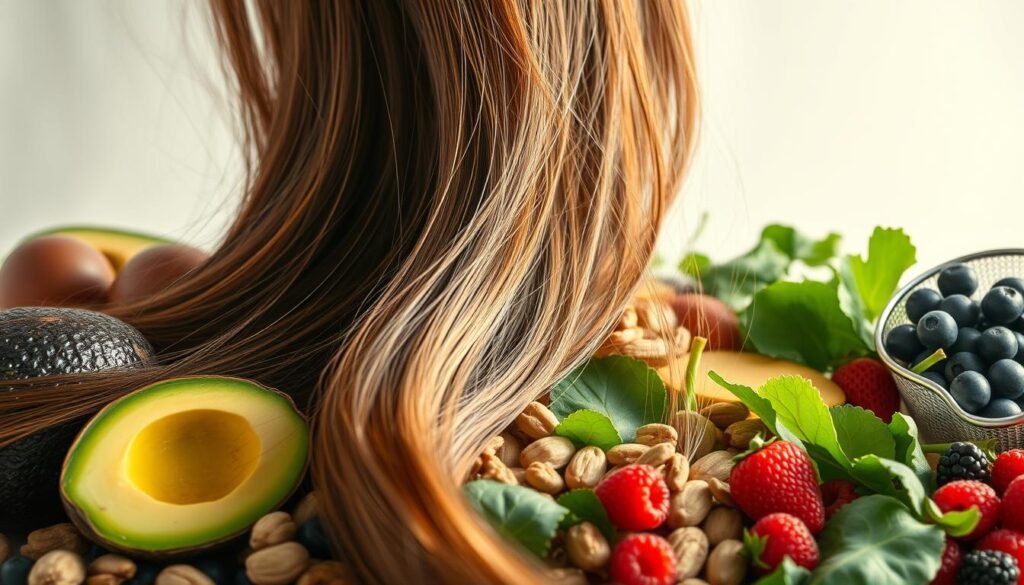
| Food to Avoid | Potential Impact on Hair Health |
|---|---|
| Processed Foods | Lack essential nutrients, contribute to inflammation and hormone imbalances |
| Excess Sugar | Increase sebum production, negatively affect blood vessels, cause nutritional deficiencies |
| High Mercury Fish | May be linked to hair loss, particularly in menopausal women |
“Maintaining a balanced diet and avoiding certain problematic foods can make a significant difference in the health and appearance of your hair.” – Hair Health Expert
By being mindful of the foods to avoid and incorporating nutrient-rich options into your diet, you can take a proactive approach to supporting your hair health and achieving the lustrous locks you desire. Remember, a holistic approach that considers both your diet and lifestyle factors can lead to the Best results.
Hydration and Hair Health
Proper hydration is essential for overall health, including the health of your hair. Water plays a crucial role in transporting essential nutrients to hair follicles and maintaining a healthy scalp. Conversely, dehydration can lead to dry, brittle hair and a flaky scalp, hampering the natural growth and maintenance of your tresses.
Importance of Drinking Water
Staying hydrated by drinking an adequate amount of water supports the body’s natural processes, including hair growth and regeneration. Adequate water intake helps keep the scalp moisturized and promotes the production of sebum, the natural oil that conditions and protects hair.
How Dehydration Affects Your Hair
When the body is dehydrated, it prioritizes directing water to vital organs, leaving the hair and scalp with limited moisture. This can result in dry, brittle hair that is more prone to breakage and split ends. Dehydration can also contribute to a flaky, irritated scalp, which can further impede healthy hair growth.
to maintain lustrous, healthy hair, it’s crucial to focus on hydration. Aim to drink at least eight 8-ounce glasses of water per day, and adjust your intake based on your activity level, climate, and any underlying health conditions. By prioritizing proper hydration, you can support the overall health and vitality of your hair.
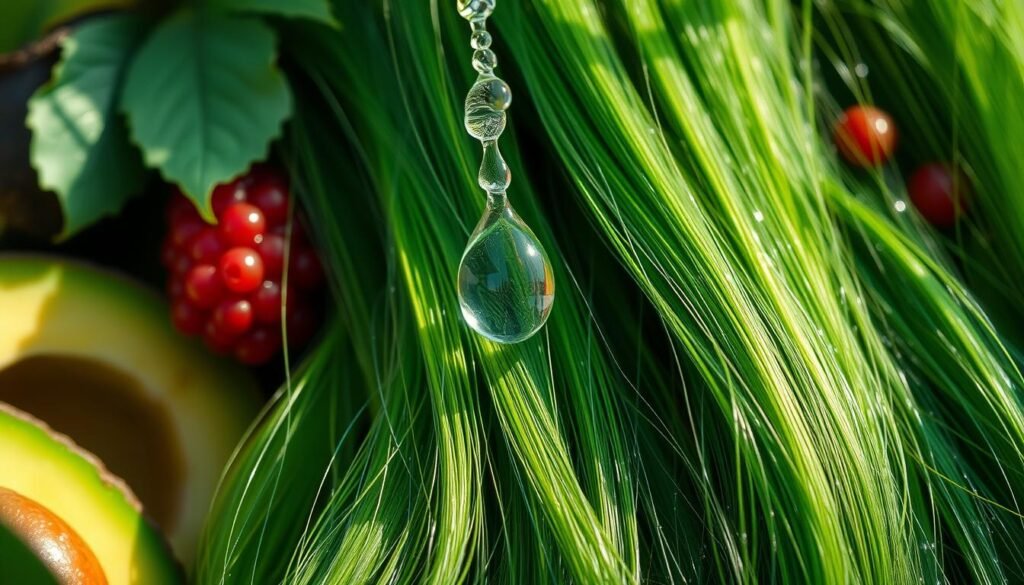
Dietary Patterns that Promote Hair Growth
When it comes to maintaining luscious locks, your diet plays a crucial role. Two dietary patterns that have been found to positively impact hair health are the Mediterranean diet and plant-based diets.
Mediterranean Diet and Hair Health
The Mediterranean diet, rich in fruits, vegetables, whole grains, and healthy fats, can be a boon for hair growth. Studies have shown that the Mediterranean diet may promote hair growth in individuals with androgenetic alopecia, a common form of hair loss. This is likely due to the diet’s high content of antioxidants, vitamins, and minerals that nourish the hair follicles and scalp.
For instance, Greek yogurt, a staple in the Mediterranean diet, is not only high in protein but also provides selenium and vitamin B12, both of which are essential for healthy hair. Lentils, another Mediterranean staple, are an excellent source of protein, with one cup providing nearly 18 grams.
Plant-Based Diets: Pros and Cons for Hair
Plant-based diets, such as vegetarian or vegan diets, can also be beneficial for hair health, but they require careful planning to ensure adequate nutrient intake. While these diets are rich in vitamins, minerals, and antioxidants, they may lack certain nutrients like protein, iron, and zinc, which are crucial for hair growth and strength.
To counteract this, individuals following a plant-based diet should focus on incorporating a variety of protein-rich foods, such as legumes, nuts, and seeds, as well as leafy greens and fortified foods to meet their nutritional needs. With proper planning, a plant-based diet can provide the essential nutrients for healthy, vibrant hair.
Ultimately, a balanced diet that includes a variety of nutrient-dense foods is generally the Best approach for promoting hair growth and maintaining overall hair health.

“A healthy diet that includes a variety of nutrient-rich foods is essential for maintaining strong, healthy hair.”
Supplements for Hair Growth
While a balanced diet packed with nutrient-rich foods is crucial for healthy hair, sometimes supplementation may be necessary to address specific deficiencies. Among the most popular supplements for hair growth are biotin, vitamins, and collagen.
Biotin: The Hair Growth Powerhouse
Biotin, also known as vitamin B7, is a star player when it comes to hair health. Biotin supplements may help improve hair growth in cases of biotin deficiency. This essential vitamin supports the production of keratin, a protein that is the building block of hair, nails, and skin.
Other Vitamins for Thicker Hair
In addition to biotin, several other vitamins and minerals can contribute to healthier, thicker hair. Vitamins A, C, D, and E, as well as zinc and iron, are all important for maintaining hair integrity and growth. Incorporating these nutrients through a balanced diet or targeted supplementation may help address any deficiencies and promote strong, lustrous hair.
The Role of Collagen Supplements
Collagen is a protein that plays a crucial role in the structure and strength of hair. Collagen supplements may help strengthen hair shafts, reduce brittleness, and potentially encourage hair growth. However, it’s important to note that excessive supplementation can be harmful, and it’s best to obtain nutrients from a balanced diet when possible.
While supplements can be helpful in certain situations, it’s always wise to consult with a healthcare professional before starting any new regimen. They can help determine if supplementation is necessary and Guide you towards the most appropriate options for your individual needs.

“Proper nutrition is the foundation for healthy, vibrant hair. Supplements can be a valuable addition, but they should never replace a nutrient-dense diet.”
Lifestyle Factors Influencing Hair Health
Maintaining healthy hair goes beyond just what we eat. Lifestyle factors, such as stress and sleep, can also have a significant impact on hair health. Genetic history predisposes to hair loss, but lifestyle factors like stress, sleep disturbances, smoking, and pollution can also influence genetic expression and create a predisposition to hair loss.
Stress Management Techniques
Stress can be a major culprit when it comes to hair loss. Nonandrogenic factors causing oxidative stress and loss of internal cellular environment can lead to hair loss with normal androgens. Fortunately, there are effective stress management techniques that can help mitigate the negative effects of stress on hair health. Activities like meditation, yoga, and regular exercise can help reduce stress and promote a healthier internal environment for hair growth.
The Importance of Sleep
Adequate sleep is crucial for overall health, and it plays a vital role in hair growth as well. Poor sleep quality can disrupt hormone levels and hinder the body’s ability to regenerate and repair, potentially contributing to hair loss over time. Aim for 7-9 hours of quality sleep each night to support your hair’s health and encourage healthy growth.
| Lifestyle Factor | Impact on Hair Health | Recommended Practices |
|---|---|---|
| Stress | Can lead to hair loss and damage | Stress management techniques like meditation, yoga, and exercise |
| Sleep | Disrupted sleep can contribute to hair loss | Aim for 7-9 hours of quality sleep each night |
By addressing lifestyle factors such as stress and sleep, you can take proactive steps to support the health and vitality of your hair. Nutrients counteract multiple mechanisms involving reactive oxygen species, neutralize free radicals, repair cellular damage, support cellular functions, and promote active hair growth.

“Hair loss can be a frustrating and complex issue, but by focusing on stress management and getting enough quality sleep, you can help create an optimal environment for healthy hair growth.”
Remember, healthy hair is a reflection of overall well-being. By addressing both dietary and lifestyle factors, you can work towards achieving the lustrous locks you’ve always desired. Lifestyle changes can lead to noticeable improvements in hair health within a few weeks to a few months, depending on individual factors such as genetics and the extent of previous damage.
Hair Care in Conjunction with Diet
A healthy diet works hand-in-hand with proper hair care to achieve lustrous, strong locks. Nutrition provides the essential building blocks for hair growth and health, while using the right hair products can help protect and maintain your tresses. Incorporating DIY hair masks made with natural ingredients can further complement a nourishing diet for optimal Hair Care.
How Nutrition Works with Hair Products
A balanced intake of proteins, vitamins, minerals, and healthy fats promotes hair growth and strength from the inside out. Once you’ve nourished your hair from within, the right Hair Care products can seal in that healthy foundation, preventing damage and breakage.
DIY Hair Masks Using Natural Ingredients
For an extra boost, you can create DIY hair masks using nutrient-dense ingredients like avocado, egg, and coconut oil. Avocados, for instance, are rich in vitamins C, A, and E, which are all essential for hair health. Incorporating these natural treatments into your routine can work in synergy with a hair-friendly diet for shiny, resilient strands.
By focusing on both your dietary intake and hair care regimen, you can create a holistic approach to achieving your healthiest, most vibrant hair. A little extra attention to these two key aspects can make all the difference in your hair’s appearance and overall well-being.
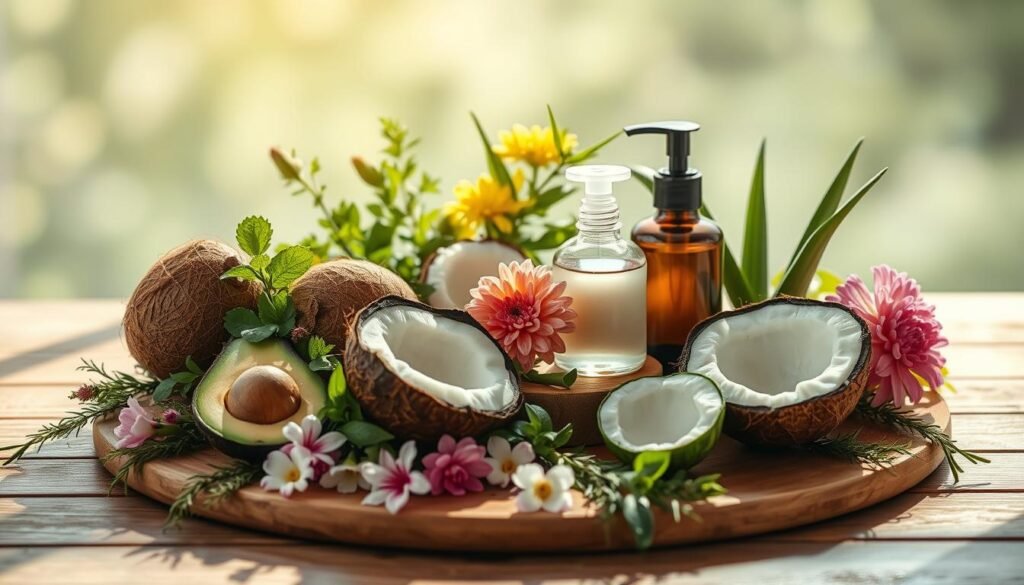
Remember, healthy hair starts from within. Nourish your locks with a balanced diet and complement it with the right hair care products and natural treatments for the best results.
Real-life Success Stories
The power of diet on hair health is undeniable, as evidenced by the remarkable transformations experienced by individuals who have made strategic dietary changes. These real-life success stories demonstrate the profound impact that nutrition can have on the quality, thickness, and overall appearance of one’s hair.
Testimonials on Diet and Hair Transformation
When 9-year-old Sarah was diagnosed with alopecia, an autoimmune condition causing hair loss, she and her family knew they needed to take a proactive approach to address the root cause. Sarah’s journey also included a diagnosis of Hashimoto’s thyroid disorder and the identification of a MTHFR gene mutation, which further complicated her health challenges. Determined to regain control, Sarah and her family worked closely with a functional-medicine expert to implement a comprehensive dietary plan.
The key dietary changes for Sarah involved eliminating gluten, dairy, nightshades, and eggs from her diet. This elimination phase lasted longer than the average patient due to Sarah’s multiple food sensitivities. Alongside the dietary modifications, Sarah’s treatment plan included iron supplements, CoQ10, evening-primrose oil, acupuncture, and essential oils prescribed by her healthcare provider.
Incorporating stress management techniques, such as neurofeedback sessions, also played a vital role in Sarah’s journey. The combination of targeted nutrition, supplementation, and holistic therapies led to a remarkable transformation, with Sarah experiencing successful hair regrowth and improvement in her skin conditions.
Case Studies of Dietary Changes Leading to Results
The connection between diet and hair health is further reinforced by the experiences of others who have seen significant improvements in their hair condition after making dietary adjustments. For instance, individuals who have lost more than 20 pounds may experience sudden shedding, as hair is primarily made of a protein called keratin. Addressing nutritional deficiencies, such as iron, biotin, and various vitamins, can also help promote healthy hair growth and prevent excessive shedding.
Incorporating healthy fats into the diet can stimulate microcirculation, leading to improved hair health. Moreover, maintaining adequate levels of calcium is crucial for preventing hair breakage and excessive shedding. These case studies demonstrate the profound impact that personalized dietary interventions can have on transforming hair appearance and overall well-being.

The real-life success stories shared here highlight the remarkable power of diet in addressing hair-related challenges. By addressing underlying nutritional imbalances, incorporating targeted supplements, and adopting holistic self-care practices, individuals have been able to regain their hair health and confidence. These compelling narratives serve as a testament to the transformative potential of a well-rounded approach to hair care.
When to Consult a Professional
If you are experiencing persistent hair loss or sudden changes in the quality of your hair, it may be time to consult a professional. A nutritionist can help identify potential deficiencies in your diet and create a personalized plan to address them. Hair loss can have various Causes, including genetics, hormonal imbalances, and underlying medical conditions. Understanding the root Causes of your hair health issues is crucial for effective treatment and management.
Signs You Need to See a Nutritionist
Significant hair shedding, thinning, or breakage may be a sign that your diet is lacking essential nutrients for healthy hair growth. Protein, zinc, and omega-3 fatty acids are particularly important for maintaining strong, shiny locks. If you’ve noticed changes in your hair’s texture, dryness, or overall appearance, a consultation with a nutritionist can help identify any nutritional deficiencies and develop a targeted plan to address them.
Understanding Hair Loss and Its Causes
Hair loss can be a frustrating and concerning issue, with many potential underlying causes. Genetic factors, hormonal imbalances, stress, certain medications, and medical conditions like thyroid disorders or anemia can all contribute to hair thinning or shedding. Consulting a healthcare professional can help determine the specific reasons behind your hair loss and develop an appropriate treatment strategy, which may include dietary adjustments, supplements, or other interventions.
FAQ
What is the best diet for healthy hair?
A balanced diet rich in essential vitamins, minerals, proteins, and healthy fats is crucial for maintaining strong, shiny, and healthy hair. Some of the key nutrients for hair health include biotin, vitamins A, C, D, and E, iron, zinc, and omega-3 fatty acids.
How does nutrition affect hair growth?
Nutrition plays a vital role in the health and growth of hair. Deficiencies in nutrients like vitamins B12, D, biotin, riboflavin, and iron can lead to hair loss and other hair-related issues. A balanced diet provides the necessary building blocks for healthy hair follicles and supports the hair growth cycle.
what are the best foods for hair health?
Some of the top foods for healthy hair include eggs, berries, spinach, fatty fish like salmon, sweet potatoes, avocados, nuts, seeds, and oysters. These foods are rich in vitamins, minerals, protein, and healthy fats that promote hair growth and strength.
What foods should I avoid for better hair health?
Processed foods, excess sugar, and high-mercury fish can negatively impact hair health. Processed foods often lack essential nutrients, while excess sugar can lead to inflammation and hormonal imbalances affecting hair growth. High-mercury fish can potentially cause hair loss.
How important is hydration for hair health?
Proper hydration is crucial for overall health, including hair health. Water helps transport nutrients to hair follicles and maintain scalp health. Dehydration can lead to dry, brittle hair and a flaky scalp, so adequate water intake is essential for healthy hair.
What supplements can help with hair growth?
Biotin, vitamins A, C, D, and E, and collagen supplements may help improve hair growth, especially in cases of deficiency. However, it’s important to note that excessive supplementation can be harmful, and it’s best to obtain nutrients from a balanced diet whenever possible.
How do lifestyle factors affect hair health?
Stress and lack of sleep can significantly impact hair health, potentially leading to hair loss. Stress management techniques, such as meditation and exercise, as well as ensuring adequate sleep, are important for supporting healthy hair growth.
When should I consult a professional for hair health issues?
Persistent hair loss or sudden changes in hair quality may warrant professional consultation. A nutritionist can help identify potential deficiencies and create a tailored diet plan. Hair loss can have various causes, including genetics, hormonal imbalances, and medical conditions, so understanding these factors is crucial for effective treatment and management.
